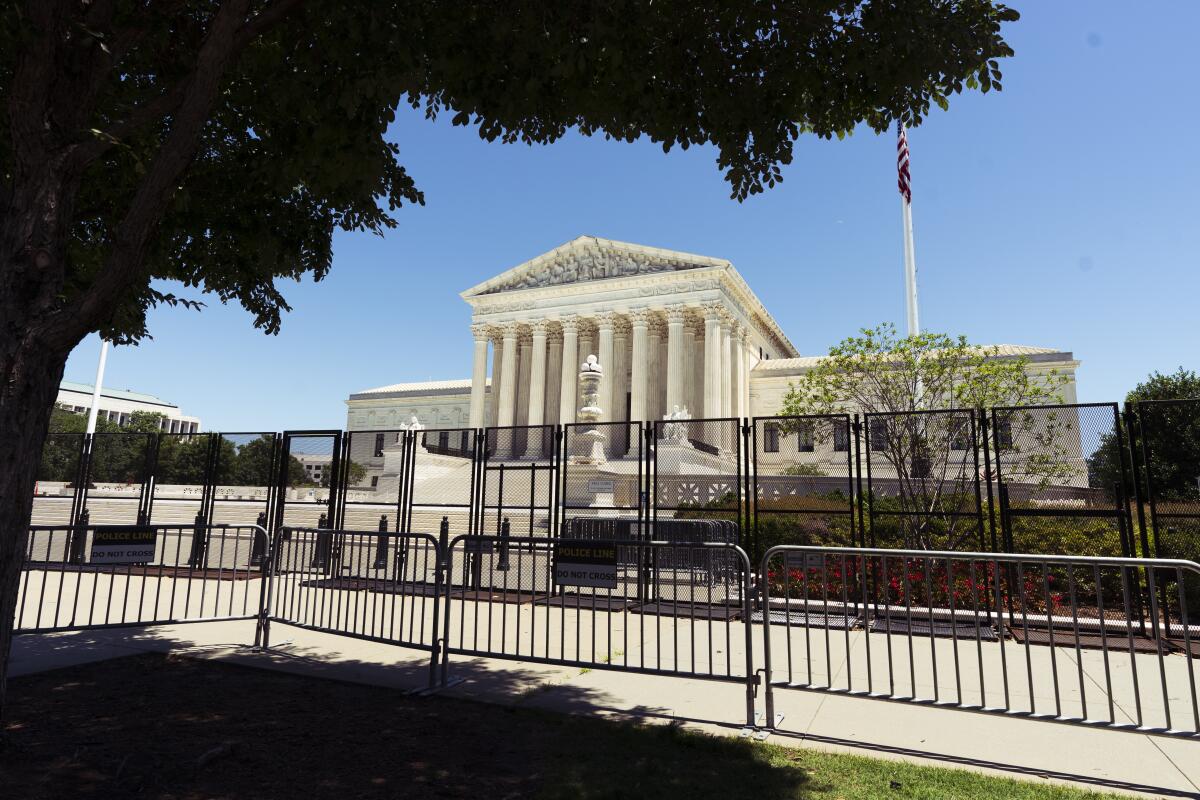Has the Supreme Court become a legal ‘vending machine’ for the right?

- Share via
Good morning. I’m Paul Thornton, and it is Saturday, July 2, 2022. Let’s look back at the week in Opinion
How much worse can it get at the U.S. Supreme Court? Last week the justices came perilously close to rock bottom with three decisions upending precedent and “deeply rooted” laws, culminating in the outright reversal of Roe vs. Wade (as opposed to simply letting the 15-week Mississippi abortion ban stand, which would have been bad enough). The other two decisions, throwing out a century-old law on concealed carry of guns in New York and forcing Maine taxpayers to subsidize private religious schools, also solidified this court’s role as what Slate legal writer Dahlia Lithwick called a “vending machine” for Republican partisans: “You put in your quarter, you get out your Skittles. You want guns, you get guns. You want Roe overturned, you get Roe overturned. No surprises.”
This is utterly depressing and deeply undemocratic — and sadly, likely a preview of what’s to come. On Monday, the court followed up its Roe reversal by delivering another blow for the Christian right, siding with a public school football coach whose year-to-year employment wasn’t renewed after he refused to stop praying with players on the 50-yard line after games.
You want school prayer, you get school prayer.
Then on Thursday, the court ruled that the U.S. Environmental Protection Agency went too far when it tried to implement sweeping regulations to limit climate-warming emissions from power plants. This, as The Times Editorial Board notes, couldn’t come at a worse possible moment, precisely when the actions taken by the federal government to limit greenhouse gas pollution must be as creative and far-reaching as possible for humanity to stand a chance of reducing climate upheaval.
You want more dirty energy, you get more dirty energy.
We’ll have to wait until the next Supreme Court term for further decisions (a break from this madness is surely in order), but on the horizon is a truly ominous possibility: The justices have decided to hear a case that could enshrine a far-right, nutty election theory into law, giving state legislatures the kind of power former President Trump said they had when he wanted them to throw out their election results in 2020. The “independent state legislature theory,” writes voting rights attorney Eliza Sweren-Becker, posits that legislatures have the constitutional right to control federal elections in their states, no matter what state courts, their governors or the voters say.
In an op-ed for The Times, Sweren-Becker is clear about where this could lead us:
“This theory, which activists are pressing the Supreme Court to consider this fall, could turn our democracy upside down. In its most extreme forms, it would throw election administration into chaos by nullifying hundreds of election laws that voters have adopted through referenda, that are written into state constitutions and that have been promulgated through administrative regulations, governing such processes as voter registration, mail voting and the guarantee of a secret ballot.
“And the theory would remove many checks and balances on state legislators, unleashing the very bodies that have been enacting laws that make it harder to vote — particularly for Americans of color — and easier to interfere in election outcomes. Under this theory, the only remaining arbiter as to the lawfulness of state legislatures’ handiwork? The Supreme Court — which has been steadily dismantling what little remains of federal law protections for our elections.”
We’d all like to think these justices wouldn’t be so flagrant as to essentially cancel the ability of voters in Republican-dominated states to pick their members of Congress or presidential electors. But look at what happened with Roe vs. Wade: Mississippi wanted the justices to uphold its 15-week abortion ban, and instead the court ruled in a way that may allow the state’s trigger law banning nearly all abortions to take effect. The court could have simply granted Mississippi’s wish, but instead it declared victory for the antiabortion movement.
And soon, the standard Democratic Party response to these outrages — “vote for us so we can appoint judges and codify your rights” — may be moot in much of the country, thanks to the Supreme Court.
The Supreme Court is not accountable to the people. So what can check its power? The answer from ACLU lawyer David Cole will leave those clamoring for immediate court restructuring disappointed, but he notes that the strategy is bearing fruit now for the conservative movement: Don’t take these decisions as the final work, fight back, vote and mobilize. The court has historically responded to changes in the public mood, even when the justices stayed the same. Cole writes: “Most important, we must elect politicians who believe in the right to abortion and the need for reasonable gun control — and then hold them to it. The best way to respond to decisions like Dobbs and Bruen is to use our civil liberties to defend the values we hold most dear.” L.A. Times
Brett Kavanaugh’s Roe vote proved it again — he has a truth problem. Sen. Susan Collins (R-Maine) provided a crucial vote to confirm Kavanaugh, partly because he led her to believe he would not vote to overturn Roe vs. Wade. He did vote to overturn Roe, evidently surprising Collins but not op-ed columnist Jackie Calmes, who writes: “Brett Kavanaugh is a serial liar. It’s jarring to write that about anyone, let alone a life-tenured justice on the Supreme Court. Yet years of evidence throughout Kavanaugh’s career show it’s a fact. And that fact, together with recent years’ confirmation controversies and Clarence Thomas’ ethical lapses, is central to understanding why public confidence in the court has dropped precipitously.” L.A. Times
Amid all the fecklessness in Washington, a brave standout: Cassidy Hutchinson is the Jan. 6 witness we’ve been waiting for. In two hours of gripping testimony to the House Jan. 6 committee, the 25-year-old former aide to Mark Meadows, the former president’s chief of staff, presented a picture of a president fully aware that he was unleashing a violent mob on the U.S. Capitol and who resisted efforts to call off the mob. Robin Abcarian writes: “In 2018, when she was a senior at Christopher Newport University in Virginia, Hutchinson told her college newspaper how thrilled she was to have been selected as a White House intern. ‘I have set a personal goal to pursue a path of civic significance,’ she said. Congratulations, Ms. Hutchinson. Few people are lucky enough to achieve their goals so young.” L.A. Times
Enjoying this newsletter? Consider subscribing to the Los Angeles Times
Your support helps us deliver the news that matters most. Become a subscriber.
Unending deaths of migrants, driven by desperation and U.S. border policies. More than 50 migrants were found dead inside a tractor-trailer in San Antonio, a devastating mass-casualty event linked to the U.S. government’s militarization of the border with Mexico. Columnist Jean Guerrero says she has hiked the inhospitable deserts that migrants are forced to traverse because of fortifications in cities like San Diego: “The border has become a mass grave and a testament to the decades-long inhumanity and irrationality of U.S. border and immigration policies. These routes are filled with Bibles, children’s photographs and other mementos brought along on the treacherous journey. Many of these items were lost as the desperate trekked through the desert or were scattered by animals who devoured the bodies.” L.A. Times
Are Joe Biden and Dianne Feinstein too old to do their jobs? Columnist Nicholas Goldberg worries they may be: “I realize that people live longer these days and that some people are more competent than others as they age (and that voters theoretically take that into account at the polls). But I still think it’s troubling to be led by so many people who came of age in a distant, nearly unrecognizable era. At some point, government becomes sclerotic, stagnant and backward-looking and requires new blood.” L.A. Times
Stay in touch.
If you’ve made it this far, you’re the kind of reader who’d benefit from subscribing to our other newsletters and to the Times.
As always, you can share your feedback by emailing me at paul.thornton@latimes.com.
A cure for the common opinion
Get thought-provoking perspectives with our weekly newsletter.
You may occasionally receive promotional content from the Los Angeles Times.







